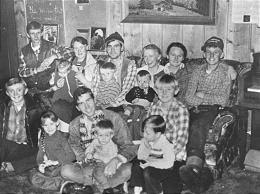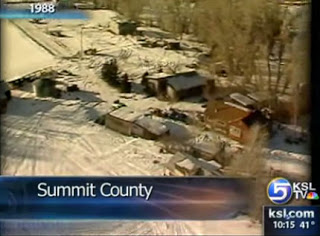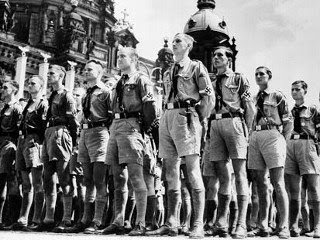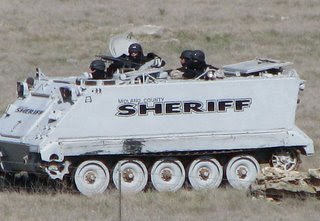Tuesday, April 7, 2009
The Ballad of John Singer
***
A brief, inadequate, and highly tendentious summary of the John Singer case.

The Singers, sans John: Vicki Singer is second from the right in the back row; below, right, the Singer farm (or, as the media put it, “compound”) as it appeared in 1988.
In the village of Marion, east of Utah’s celebrity-overrun Park City, can be found a 2.5-acre tract owned by the family of John Singer.
A reservoir located just south of the farm is fed by the runoff from nearby Hoyt’s Peak.
Even in late summer, when the pitiless sun drives most residents of northern Utah to seek refuge in air-conditioned rooms, the pristine waters of that reservoir are bracingly cool. So it’s hardly surprising that Jeff Edrington and Spencer Smith were found playing in that reservoir on a blistering day in late July 1973.
Unfortunately, neither of the young boys had told an adult where they were going. So nobody was there to help them when the raft on which they were lounging overturned, leaving them stranded in the middle of the lake. The water was easily deep enough to drown in, and the boys were too far from the shore to make it on their own.
After hearing desperate cries for help, Heidi Singer frantically sprinted home to tell her father. A few minutes later the wiry 42-year-old farmer crested a nearby hill just in time to see one of the boys lose his battle to retain buoyancy. Without breaking stride, John dove into the lake. Muscles hardened by farm work quickly carried him to the drowning child; hands strengthened by milking dairy cows grasped the boy firmly and carried him to the surface.
A few seconds later Jeff Edrington was ashore, coughing lake water from his lungs and — despite temperatures that threatened to cross the century mark — shivering. “Where’s Spencer?” Jeff asked Heidi as her father made several more urgent attempts to find the other boy. Each dive took John a little deeper, and each time he stayed underwater a little longer, but little Spencer couldn’t be found.
For nearly a half-hour John Singer kept up the search before succumbing to exhaustion. By this time, Jeff Edrington’s father Val had arrived to comfort his son. With tearful gratitude Val Edrington took one of John Singer’s hands in both of his and thanked him for the life of his son.
“It might as well have been two boys who drowned today if it weren’t for you, John,” the elder Edrington sobbed.
Five years later, the same Val Edrington who embraced John Singer and tearfully thanked him for saving the life of his son would publicly call for Singer to be murdered under the color of “law” — for the supposed crime of protecting his own children from the state.
Just weeks before Singer rescued Edrington’s son, he and his wife Vicki had removed their children from local government-run schools. The Singers were motivated primarily by religious and moral concerns; they believed that their children were threatened with both bodily and spiritual harm by a system that taught secular, collectivist principles and cultivated moral laxity.
At the time, Edrington was the superintendent of the Summit County school district. Even though homeschooling was hardly a novelty even in 1973, he was determined to compel Singer to surrender his children for state indoctrination.
When the school board met in September of that year, recall David Fleisher and David M. Freedman in Death of an American, their 1983 book about the Singer case, Edrington testified that he was reluctant “to file a complaint against the Singers in juvenile court” on account of the fact that Singer had saved his son’s life.
Putting aside whatever misgivings he felt, Edrington dutifully collaborated with the school board by signing a December 6, 1973 criminal complaint alleging that John and Vickie Singer had contributed to the delinquency of three of their children “by withdrawing said minor children from school, and failing to comply with policies and standards set out for the education of said children as provided in the Utah Code.”
By presuming to educate their own children as they saw fit, in their own home, the Singers were committing a crime “against the peace and dignity of the state of Utah,” huffed the criminal complaint.
Perhaps, if Edrington had chosen not to sign that complaint — if he had defended Singer as an honorable man and caring father — Utah would have been spared what would turn into a 15-year struggle with John Singer and his family, a conflict punctuated by the needless deaths of two men, both of them fathers with children to raise. But Edrington — like a half-dozen other officials in key positions — believed that loyalty to the state and its positivist “laws” is the highest moral obligation.
Within that pusillanimous company, Edrington distinguished himself — first, because of his manifest ingratitude to Singer for saving the life of his own son, and second, because of the perverse enthusiasm he would display for the use of lethal coercion against Singer for daring to defy the state.
By virtue of both background and character, John Singer was ill-suited for the saddle of the state. Two years after he was born in Brooklyn, Adolf Hitler came to power in Germany. His German-born father Hans, who had joined the National Socialist Party in 1923 (his party membership card was #4278), eagerly returned to the Fatherland in anticipation of the Aryan Millennium.
Upon turning ten, John was compelled to enlist in the Hitler Youth, and organization he quickly came to despise. His father — over the objections of his wife, Charlotte — also enrolled John and his brother Harald in an elite prep school run by the SS. Within a year and a half both John and Harald — to their eternal credit — were expelled from the SS-run school for insubordinate and “rebellious” behavior.
Unlike her husband, Charlotte was a devoutly religious woman, a convert to the Mormon faith, and she instilled in her children both a sense of traditional morality and a marrow-deep hatred for authoritarian conformity. This put the three of them immediately at odds not only with Hans, but also with the state-run Nazi school system, in which despotism and depravity were firmly welded together.

“A civil service act in 1937 required teachers to be `executors of the will of the party-supported state,’ which they were to defend `without reservation,'” recall Fleischer and Freedman in Death of an American. “A local youth office could obtain a guardianship court order to take children away from families whose political or religious convictions were questionable, who befriended Jews, or who refused to enroll their children in the Hitler Youth. The youth office then placed the children in `politically reliable’ homes. In addition, parents could be fined or imprisoned for withholding their children from participation in party youth activities, even those parents who merely objected that such activities were responsible for the high pregnancy rate among teenage girls.”
Following the war, Charlotte and her sons and daughter Edeltraud found their way to Utah. John and Harald were drafted into the U.S. military, which reinforced their hatred of regimentation. Following his discharge, John found work as a television repairman, eventually opening his own business.
Although he was an active and faithful Mormon, John gravitated toward a controversial “fundamentalist” named Gus Weller, who believed that the LDS Church had compromised too much when it abandoned polygamy and jettisoned other controversial teachings and practices. Weller provided John with the tract of land on which he built his home and farm, and, eventually, his one-room schoolhouse. This is the same home that would later be referred to as the “Singer Compound” during conflicts with state authorities.
In September 1963, 32-year-old John married 20-year-old former homecoming queen Vicki Lemon. In order to exchange their vows the couple — both of whom were of legal age — had to flee to Elko, Nevada a few steps ahead of a posse organized by the bride’s family, who considered the groom to be entirely unsuitable. The plan was to have John arrested for kidnapping, and Vicki forcibly committed to a mental hospital in Provo. The couple managed to elude the dragnet long enough to be married, and things settled down after they settled in on their homestead near Marion, Utah.
The chief reason Vicki’s parents objected to the marriage was John’s reputation as an “apostate.” His was the hand always raised in Sunday School to challenge the prepackaged certitudes offered by the instructor.
It wasn’t that Singer was an unbeliever; it was that he believed too strongly in the pure, uncut Mormonism of the pre-1890 vintage, rather than what he considered to be an inferior, attenuated version being preached by his contemporaries. (In 1978, Singer became a polygamist, taking Shirley Black as a “plural wife.”)
Singer was constantly rebuked by co-religionists who often recited the familiar admonition, “When our leaders speak, the thinking has been done.” Not surprisingly, given his formative experiences in Nazi Germany, Singer found that line of thought unpersuasive, and he once “had the audacity to compare the mentality of those church members who blindly follow their leaders to the obedience of the German people to Hitler during World War II,” observe Fleischer and Freedman.
In 1972, John and Vicki’s theological views led to their excommunication from the LDS Church. Sitting in the Church Court that handed down that sentence were the principal of the local school and several other officials who would later seek to imprison John and Vicki for “child neglect” and “contempt of court.” And their status as “apostates” made it difficult to earn a living, or maintain reliable friendships: “On their shopping trips to Kamas,” write Fleischman and Freedman, “John and Vicki would encounter burning stares of rage and hate from the people.”
In February 1978, five years after Singer had begun to educate his children at home, Edrington met with a Summit County citizen’s group formed to advise the school board. The protracted struggle between the Singer family and the state of Utah dominated the meeting. When one participant chided the board for pursuing the matter too zealously, Edrington replied that he intended to “press the matter to the very ultimate.”
“John Singer has broken the law,” declared Edrington, no doubt with Pharisaical piety oozing from every syllable, “and if pressing the issue means that John Singer will be killed, then that’s the way it will be.”
Keep in mind that Edrington was not referring to someone who had committed a capital crime, or any offense against persons or property. John Singer wasn’t a fugitive from justice. He hadn’t so much as left a parking ticket unpaid, or failed to return a book to the local public library. Singer’s initial “crime” was to educate his own children in his own home, at his own expense.
But by the time Edrington publicly approved of the idea of killing John Singer, the real issue was no longer the rights of Singer or his children, but rather the injury Singer’s defiance had done to the institutional vanity of Utah’s judicial system.
Pursuant to an agreement extorted from them by the state, the Singers permitted their four oldest children to be tested by school district officials in October 1974 and April 1975. They also agreed to follow a homeschooling plan approved by the district. In exchange they were granted a “certificate of exemption,” which was essentially a scrap of paper polluted with boilerplate language certifying that they would be permitted the “privilege” of teaching their own children.
After the Singers informed the school district that they would countenance no further interference in the upbringing of their children, they were once again accused of “criminal neglect” toward their offspring.
So acute was that “neglect” that the Singers were spending hours each day teaching those children in a schoolhouse they constructed, using books, projectors, and other equipment they had purchased at their own expense.
The pitiable Singer children were given personalized instruction by the most motivated teachers whenever any of them had difficulty with an assignment. With damnable indifference to the well-being of their heirs, the Singers taught them the value of rigorous, honest work under the open sky, imparting to them an ethic of self-reliance while the inmates of the collectivist hive were being raised as dutiful conformists and consumers.
For deflecting several efforts by the school system to seize control of his home school program, Singer had been cited for “contempt of court” — that all-encompassing non-offense that occurs anytime somebody fails to treat a pathologically vain cross-dresser with a gavel like an vacationing Olympian deity.
Writing with reference to a familiar tactic, Joel Skousen points out: “Notice, that if you ever resist bureaucratic ‘law,’ you are not prosecuted for resisting an inane and unconstitutional law, but for `defying the court’ or `resisting arrest.’ Separating the act of resistance from the initial law which motivated the act is one of the slickest ways to bring a populace into line with bureaucratic law.”
In 1978, while the State of Utah was devising plans to arrest and prosecute the Singers, Daniel Kingsley, a professor at the University of Utah, visited the Singer home school along with his wife Lynn, a licensed social worker. They had little in common philosophically or theologically with the Singers. Yet a decade earlier they had withdrawn their own children from government-run schools and educated them, along with neighbor kids, in the basement of their own home in Salt Lake City. Eventually their home school grew into a full-time private academy — the Kingsley School — with an enrollment of 350.
“I’ve never heard of any parents in Utah being hassled as badly as the Singers over this compulsory attendance issue,” Lynn Kingsley remarked to a state legislator. Unlike the Singers, the Kingsleys — most likely because of the husband’s academic credentials and the wife’s role as a licensed social worker — were regarded as citizens in good standing, despite the fact that they had defied the same “compulsory attendance” law.
Judge John Farr Larson, who was in charge of the Singer case by this time, was familiar with the Kingsleys‘ private school and had expressed approval of it. He permitted the Kingsleys to visit the Singer home and report their findings.
“I could see that the education the Singer children are getting is not the same as they would get in public schools,” Lynn Kingsley testified later. “But in some ways their education is superior…. Not one of them will ever be welfare cases when they grow up. They are learning responsibility…. I would love to have the children in my school visit that farm and learn some of the things Mr. Singer teaches his kids.”
“It is a marvelous method to sit around the table with children, on a small-group basis, with a very individualized approach, and this is what the Singers do in their home school,” continued Mrs. Kingsley. “To put the children back in public school at this time would be like leading lambs to slaughter.”
Ah, but what about “socialization,” the cardinal virtue of goverment education and its all-sufficient justification?
“The last thing the Singer children need to worry about is being social,” Lynn observed. “They have more friends and relatives up there to play with than almost any group of kids I’ve ever known…. I wish that all of the children that come ot my school looked and acted and behaved as courteously as the Singer children. I felt very much that these children have been taught some social graces.”
Judge Larson’s reaction to this testimony was to order the Singers to collaborate with the Kingsleys “to establish a private school that … meets the educational stadards of the state.” He also ordered Singer to submit to arrest on contempt charges. John and Vicki were smart enough to recognize that there was a loaded gun hidden inside the bouquet offered by Larson, and refused to comply. Singer made it known that he would resist, by armed force, any effort to take him into state custody.
This prompted yet another escalation by the State of Utah in its jihad against the Singers.
In October 1978, four police officers disguised as a television reporter and camera crew ambushed Singer on his property and attempted to kidnap him. Like most of the tax-fattened specimens who follow that profession, Singer’s would-be abductors were in terrible shape and thus no match for the sinewy middle-aged farmer.
After wrenching himself free, Singer pulled a thirty-eight from his waistband and ordered the thugs from his property. “Get off me, or I’ll kill you!” Singer commanded. By this time Vicki and the Singer children had arrived.
Mrs. Singer caught Robert Wadman, the ringleader, by the tie, shoved a fist in his face, and informed him that she was about to “knock [his] teeth out.” Several of the Singer children, propelled by righteous fury over the criminal assault on their father, launched themselves at the officers, clawing, kicking, and punching them in a frenzy of filial loyalty. Panicking and all but wetting themselves, the officers withdrew, all the while piteously pleading not to be shot.
John later confided to Vicki that his pistol wasn’t loaded. Grant Larsen, one of the officers Singer fought off single-handedly, later said that the soft-spoken, mild-mannered farmer “was the toughest man I ever grabbed hold of.”
As Singer’s story gained national prominence, his family gained a few allies. One of them was Samuel Taylor, a Democratic state representative from Salt Lake and one of the most liberal members of the state legislature. Taylor did everything he could to persuade Judge Larson to relent.
“I have never known of any case where parents and children were as demeaned and humiliated both by the courts and by the press as in the Singer case,” wrote a disgusted Rep. Taylor in a late 1978 letter to Larson. “It was the state and not the Singers who were guilty of child abuse.” Taylor offered to act as a mediator between the judge and the family to prevent further violence of potential bloodshed. He suggested that the court could save face by treating John Singer’s self-imposed exile on the property as a form of “home confinement,” thereby obviating the perceived need to have him arrested.
Larson, however, wasn’t willing to budge so much as a millimeter. In a sworn statement made during a subsequent investigation of the conflict, Judge Larson — employing the refined, scholarly diction of his elevated calling — referred to Taylor’s efforts at mediation as “a bunch of bullshit.”
Because he had forcibly resisted the criminal aggression of state agents, a felony bench warrant was issued for John Singer. This warrant was “legal” authorization to exercise deadly force. Armed with that license to kill, several state agencies, in cooperation with the FBI, spent the winter of 1978 devising various plans to seize Singer. Eventually a base of operations was set up at a nearby house, and snowmobiles carrying armed officers were used to keep the Singers under constant surveillance.
The plan to apprehend Singer relied on an overwhelming show of force — “shock and awe,” as it were, involving a large number of armed men. One key piece of intelligence that worked to the State’s advantage dealt with Singer’s well-established beliefs: It was known, as a moral certainty, that Singer would not fire the first shot.
“The key to the plan,” recalled Ron Gunderson, who took part in the arrest, “was that a resonable man, when surrounded and confronted with a show of force, would submit. The problem was, John Singer was not a reasonable man.”
Gunderson and nine other tax-feeders were lying in wait on the morning of January 18, 1979, when Singer was seen clearing his driveway with a snow-blower. When he spied four officers approaching him, Singer turned toward his house while reaching for his thirty-eight Colt revolver. Singer’s back was turned to the assailants when he was mortally wounded by a shotgun blast.
Singer’s murder appeased those running the apparatus of state coercion. Having conspired in the retalitatory murder of a dangerous political dissident, Judge Larson eventually permitted Vicki Singer to resume teaching her children as she saw fit.
“It’s very ironic, to say the least … [that] now I’m teaching my kids the same way that John and I did before he died, and I think the state knows it,” Vicki commented several months after the murder. “But all they wanted to do was to show us, and show the people, that if anybody tried to come against the system, watch out because this is what can happen to you.”
With the help of Gerry Spence, the Singers attempted to obtain civil redress for the murder of John. Not surprisingly, the judicial and law enforcement establishment in Utah quickly closed ranks, and the suit was quickly dismissed.
That’s where matters stood until January 1988, when Addam Swapp, a vainglorious young man who marred two of Singer’s daughters, set off a bomb at a local Latter-day Saint meetinghouse in what he described as a divinely ordained terrorist act intended to bring about John Singer’s ressurection and the Second Coming of Christ. In the subsequent 13-day siege Swapp shot and killed a corrections officer named Fred House.
Eventually Swapp was convicted of homicide and various charges related to the bombing and sent to state prison, where he will remain until at least 2012. Vicki Singer, also arrested in the siege, was given a five-year prison sentence.
There is no justification for Swapp’s terrorist act. However, to explain is not necessarily to justify. It seems reasonable to believe that the adamant refusal of Utah’s “justice system” to provide redress to the Singers helped cultivate the fanaticism that sustained Swapp’s deranged attempt to summon the Millennium through violence.
It’s difficult to imagine that John Singer would have approved of Swapp’s crimes. Although firmly committed to the defense of his family, even to the point of bloodshed, Singer — whatever one thinks of his theology — believed in and practiced the principle of non-aggression.
Singer’s experiences living under the National Socialist version of the paternalistic state left him with a marrow-deep aversion to collectivism and conformity. As the product of a broken home presided over by a fanatical and abusive father, Singer came to appreciate the need for each of his children to develop as an individual, and to give them loving individual attention.
In many ways, the six-year war waged by Utah against the Singer family was the prototype for the more widely known atrocities at Ruby Ridge and Waco. Because of its roots in the subculture of Mormon fundamentalism and polygamy the Singer episode likewise foreshadowed the mass kidnapping of FLDS children by the State of Texas a year ago.
What distinguishes the Singer case from the others, however, is this: Unlike the Weavers, the Branch Davidians, or the FLDS, the Singers were being persecuted by people almost exactly like them simply because they were seen as non-conformists — excommunicated apostates from The Church, defiantly resisting the demands of The Law.
Singer “caused [Utah’s] theocratic power structure to rock and reel with national publicity that focused on the way this simply Mormon excommunicant was being treated by the Mormon moral majority,” declared Gerry Spence, who represented Vicki Singer in her short-lived lawsuit against the State. The Singer family’s stand had revealed the state’s power structure to be “unreasonable, incompetent, unjust, and immoral. And the power structure would not tolerate it.”
Accordingly, the state’s enforcement apparatus, on the pretext of looking after the best interests of the Singer children, finally “subdued and conquered this renegade Mormon” by arranging to have him shot in the back.
Today, parents throughout Utah are free to school their children at home without dealing with many of the impedimentia (such as standardized testing, home inspections, or review of detailed educational records) that were thrown in the path of the Singer family by a vile and vindictive state government.
Judge Larson, who signed John Singer’s death warrant, died and went to hell in 1994. His departure inspiring nauseating eulogies from the Deseret News — Utah’s largest and most reprehensible newspaper — for being a “devoted family man” and “outstanding citizen.”
As far as I can tell, Val Edrington still labors in the educational establishment, and continues to find new ways to spread needless misery. The odds are good that his son Jeff — who would be around my age — is still alive with a family of his own. I wonder, but not for long, if Val has told his grandchildren that he helped kill the man who saved their daddy’s life.
Available now!
Dum spiro, pugno!
Content retrieved from: http://freedominourtime.blogspot.com/2009/04/ballad-of-john-singer.html.








